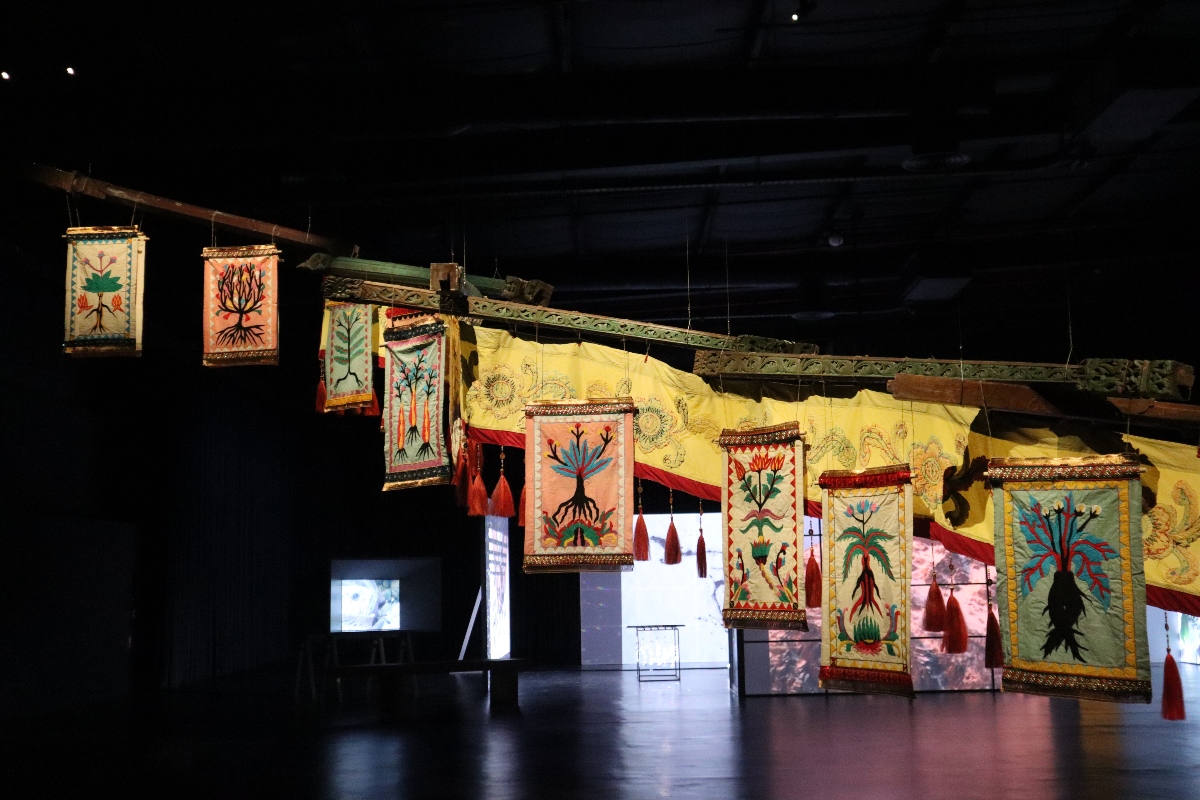JAKARTA: Suspended on antique wooden pillars floating at the Diriyah Contemporary Art Biennale venue, embroidered scrolls form a stream of symbolic images, each of them displaying the centuries-old connections of the Indonesian island of Bali with the Muslim world.
Titled “Rivers With No End,” the installation is a work of Citra Sasmita, a Balinese artist who made her Middle East debut at the international showcase underway in Riyadh since late February.
“‘Rivers With No End’ is my interpretation of knowledge, history and how Islamic culture spread across Indonesia through maritime routes,” Sasmita told Arab News.
“It is also an interpretation of how fluid Islamic knowledge is, how it touches cultural roots wherever it lands, which leads to acculturation that continues to evolve to this present day, staying relevant and keeping up with the spirit of the times.”
The carved wooden pillars take reference from the architectural styles from the Indonesian islands of Java and Bali and are meant to symbolize Wali Songo — the nine legendary saints of Javanese Islam.
On one side hangs an 8-meter-long embroidered scroll, which takes inspiration from the Bugis seafarers, a Muslim ethnic group and heirs to an ancient maritime tradition, who centuries ago arrived in Bali from the island of Sulawesi.
Smaller pieces of fabric hang on the other side, showing handmade embroideries of herbs and medicinal plants that she found when reading the Qur’an and old Hindu manuscripts.
Through her work, Sasmita explores the vastness of the world’s largest archipelagic country and the influence of Islam on her home island, where Hinduism is the majority religion.

This photo shows "Rivers With No End" installation by Balinese artist Citra Sasmita at the 2024 Diriyah Contemporary Art Biennale in Riyadh. (Citra Sasmita)
To make the artwork a reality, the 33-year-old artist first traveled to Jembrana, West Bali, last October in search of a priestess. There, in one of Bali’s oldest Muslim villages known as Loloan, she learned an ancient embroidery technique.
“The embroidery technique that I am showing in Riyadh is an old technique and on the brink of extinction,” Sasmita said.
“The process turned out to be quite difficult, to find a community of women who are able to do this type of embroidery. They used to be there (in Jembrana), but there’s no more market for their craft.”
For years, such embroideries were left as ritual decorations for religious occasions, and without adequate commercial orders to sustain the craft, the skilled women had to change professions, with most turning to farming to make a living.
“This project has also moved me to work out a way to revitalize this old technique. It is an ongoing process, and I am working with the priestess who is skilled in this craft,” she said.
The craft’s links with religious rituals were apparent in the choices of color, Sasmita said, as the priestess chose shades that resonated with spiritual aspects, like yellow to represent light and red to depict fire.
But before she visited Riyadh for the opening of the Diriyah Biennale last month, she was uncertain as to how Arabs would receive her work as it is her first exhibition in the region.
“But I found that they appreciated my work and were interested in the skillful embroidery technique … They were curious, and there I took a lot of questions and inquiries,” Sasmita said.
Her Diriyah project, rich with knowledge and history, became an example of how visual interpretation works as a language of its own.
“I’d (focused) on how the idea behind the work can be conveyed, that in the context of Indonesia as an archipelagic nation, the influence of Islam is rooted almost everywhere,” she said.
“(My work) … shows the diversity of Islam in Indonesia, its expression in social structures and cultures, and how art is also a spiritual path.”
Sasmita, whose work is also currently showing at the 25th Sydney Biennale, said she feels very proud of the “incredible opportunity” offered at the Diriyah Biennale.
“Contemporary art in Saudi Arabia is exceptional, they talk about technology and how art can have an impact on sustainability, which is why they invited artists and researchers whose work has had a social impact and contributes to problem-solving in today’s world,” she said.
“I think they intend to be more open-minded to various free expressions of art.”





















